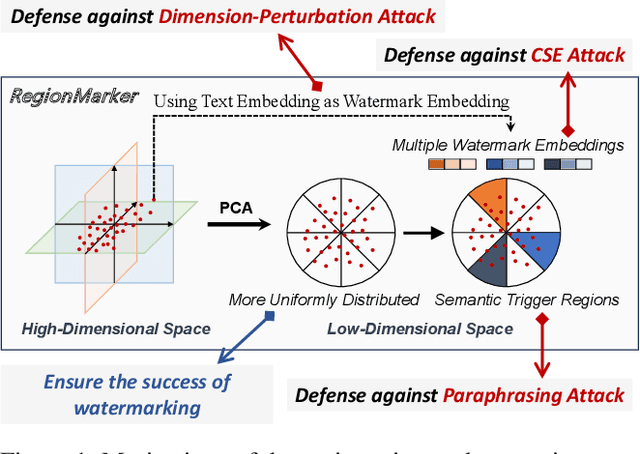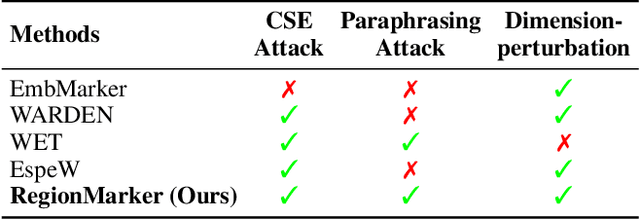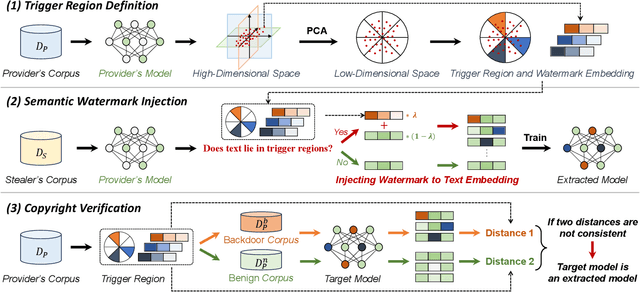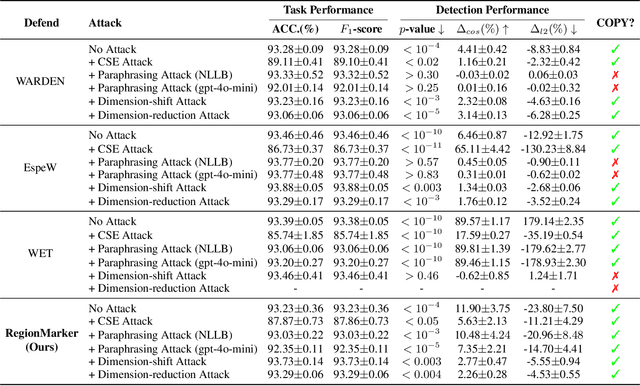Yafeng Yin
RegionMarker: A Region-Triggered Semantic Watermarking Framework for Embedding-as-a-Service Copyright Protection
Nov 17, 2025



Abstract:Embedding-as-a-Service (EaaS) is an effective and convenient deployment solution for addressing various NLP tasks. Nevertheless, recent research has shown that EaaS is vulnerable to model extraction attacks, which could lead to significant economic losses for model providers. For copyright protection, existing methods inject watermark embeddings into text embeddings and use them to detect copyright infringement. However, current watermarking methods often resist only a subset of attacks and fail to provide \textit{comprehensive} protection. To this end, we present the region-triggered semantic watermarking framework called RegionMarker, which defines trigger regions within a low-dimensional space and injects watermarks into text embeddings associated with these regions. By utilizing a secret dimensionality reduction matrix to project onto this subspace and randomly selecting trigger regions, RegionMarker makes it difficult for watermark removal attacks to evade detection. Furthermore, by embedding watermarks across the entire trigger region and using the text embedding as the watermark, RegionMarker is resilient to both paraphrasing and dimension-perturbation attacks. Extensive experiments on various datasets show that RegionMarker is effective in resisting different attack methods, thereby protecting the copyright of EaaS.
Steering When Necessary: Flexible Steering Large Language Models with Backtracking
Aug 25, 2025Abstract:Large language models (LLMs) have achieved remarkable performance across many generation tasks. Nevertheless, effectively aligning them with desired behaviors remains a significant challenge. Activation steering is an effective and cost-efficient approach that directly modifies the activations of LLMs during the inference stage, aligning their responses with the desired behaviors and avoiding the high cost of fine-tuning. Existing methods typically indiscriminately intervene to all generations or rely solely on the question to determine intervention, which limits the accurate assessment of the intervention strength. To this end, we propose the Flexible Activation Steering with Backtracking (FASB) framework, which dynamically determines both the necessity and strength of intervention by tracking the internal states of the LLMs during generation, considering both the question and the generated content. Since intervening after detecting a deviation from the desired behavior is often too late, we further propose the backtracking mechanism to correct the deviated tokens and steer the LLMs toward the desired behavior. Extensive experiments on the TruthfulQA dataset and six multiple-choice datasets demonstrate that our method outperforms baselines. Our code will be released at https://github.com/gjw185/FASB.
Aligning LLM with human travel choices: a persona-based embedding learning approach
May 25, 2025Abstract:The advent of large language models (LLMs) presents new opportunities for travel demand modeling. However, behavioral misalignment between LLMs and humans presents obstacles for the usage of LLMs, and existing alignment methods are frequently inefficient or impractical given the constraints of typical travel demand data. This paper introduces a novel framework for aligning LLMs with human travel choice behavior, tailored to the current travel demand data sources. Our framework uses a persona inference and loading process to condition LLMs with suitable prompts to enhance alignment. The inference step establishes a set of base personas from empirical data, and a learned persona loading function driven by behavioral embeddings guides the loading process. We validate our framework on the Swissmetro mode choice dataset, and the results show that our proposed approach significantly outperformed baseline choice models and LLM-based simulation models in predicting both aggregate mode choice shares and individual choice outcomes. Furthermore, we showcase that our framework can generate insights on population behavior through interpretable parameters. Overall, our research offers a more adaptable, interpretable, and resource-efficient pathway to robust LLM-based travel behavior simulation, paving the way to integrate LLMs into travel demand modeling practice in the future.
Contrastive Prompting Enhances Sentence Embeddings in LLMs through Inference-Time Steering
May 19, 2025Abstract:Extracting sentence embeddings from large language models (LLMs) is a practical direction, as it requires neither additional data nor fine-tuning. Previous studies usually focus on prompt engineering to guide LLMs to encode the core semantic information of the sentence into the embedding of the last token. However, the last token in these methods still encodes an excess of non-essential information, such as stop words, limiting its encoding capacity. To this end, we propose a Contrastive Prompting (CP) method that introduces an extra auxiliary prompt to elicit better sentence embedding. By contrasting with the auxiliary prompt, CP can steer existing prompts to encode the core semantics of the sentence, rather than non-essential information. CP is a plug-and-play inference-time intervention method that can be combined with various prompt-based methods. Extensive experiments on Semantic Textual Similarity (STS) tasks and downstream classification tasks demonstrate that our method can improve the performance of existing prompt-based methods across different LLMs. Our code will be released at https://github.com/zifengcheng/CP.
MixSignGraph: A Sign Sequence is Worth Mixed Graphs of Nodes
Apr 16, 2025Abstract:Recent advances in sign language research have benefited from CNN-based backbones, which are primarily transferred from traditional computer vision tasks (\eg object identification, image recognition). However, these CNN-based backbones usually excel at extracting features like contours and texture, but may struggle with capturing sign-related features. In fact, sign language tasks require focusing on sign-related regions, including the collaboration between different regions (\eg left hand region and right hand region) and the effective content in a single region. To capture such region-related features, we introduce MixSignGraph, which represents sign sequences as a group of mixed graphs and designs the following three graph modules for feature extraction, \ie Local Sign Graph (LSG) module, Temporal Sign Graph (TSG) module and Hierarchical Sign Graph (HSG) module. Specifically, the LSG module learns the correlation of intra-frame cross-region features within one frame, \ie focusing on spatial features. The TSG module tracks the interaction of inter-frame cross-region features among adjacent frames, \ie focusing on temporal features. The HSG module aggregates the same-region features from different-granularity feature maps of a frame, \ie focusing on hierarchical features. In addition, to further improve the performance of sign language tasks without gloss annotations, we propose a simple yet counter-intuitive Text-driven CTC Pre-training (TCP) method, which generates pseudo gloss labels from text labels for model pre-training. Extensive experiments conducted on current five public sign language datasets demonstrate the superior performance of the proposed model. Notably, our model surpasses the SOTA models on multiple sign language tasks across several datasets, without relying on any additional cues.
Implicit Location-Caption Alignment via Complementary Masking for Weakly-Supervised Dense Video Captioning
Dec 17, 2024



Abstract:Weakly-Supervised Dense Video Captioning (WSDVC) aims to localize and describe all events of interest in a video without requiring annotations of event boundaries. This setting poses a great challenge in accurately locating the temporal location of event, as the relevant supervision is unavailable. Existing methods rely on explicit alignment constraints between event locations and captions, which involve complex event proposal procedures during both training and inference. To tackle this problem, we propose a novel implicit location-caption alignment paradigm by complementary masking, which simplifies the complex event proposal and localization process while maintaining effectiveness. Specifically, our model comprises two components: a dual-mode video captioning module and a mask generation module. The dual-mode video captioning module captures global event information and generates descriptive captions, while the mask generation module generates differentiable positive and negative masks for localizing the events. These masks enable the implicit alignment of event locations and captions by ensuring that captions generated from positively and negatively masked videos are complementary, thereby forming a complete video description. In this way, even under weak supervision, the event location and event caption can be aligned implicitly. Extensive experiments on the public datasets demonstrate that our method outperforms existing weakly-supervised methods and achieves competitive results compared to fully-supervised methods.
Token Prepending: A Training-Free Approach for Eliciting Better Sentence Embeddings from LLMs
Dec 16, 2024Abstract:Extracting sentence embeddings from large language models (LLMs) is a promising direction, as LLMs have demonstrated stronger semantic understanding capabilities. Previous studies typically focus on prompt engineering to elicit sentence embeddings from LLMs by prompting the model to encode sentence information into the embedding of the last token. However, LLMs are mostly decoder-only models with causal attention and the earlier tokens in the sentence cannot attend to the latter tokens, resulting in biased encoding of sentence information and cascading effects on the final decoded token. To this end, we propose a novel Token Prepending (TP) technique that prepends each layer's decoded sentence embedding to the beginning of the sentence in the next layer's input, allowing earlier tokens to attend to the complete sentence information under the causal attention mechanism. The proposed TP technique is a plug-and-play and training-free technique, which means it can be seamlessly integrated with various prompt-based sentence embedding methods and autoregressive LLMs. Extensive experiments on various Semantic Textual Similarity (STS) tasks and downstream classification tasks demonstrate that our proposed TP technique can significantly improve the performance of existing prompt-based sentence embedding methods across different LLMs, while incurring negligible additional inference cost.
Toward LLM-Agent-Based Modeling of Transportation Systems: A Conceptual Framework
Dec 09, 2024Abstract:In transportation system demand modeling and simulation, agent-based models and microsimulations are current state-of-the-art approaches. However, existing agent-based models still have some limitations on behavioral realism and resource demand that limit their applicability. In this study, leveraging the emerging technology of large language models (LLMs) and LLM-based agents, we propose a general LLM-agent-based modeling framework for transportation systems. We argue that LLM agents not only possess the essential capabilities to function as agents but also offer promising solutions to overcome some limitations of existing agent-based models. Our conceptual framework design closely replicates the decision-making and interaction processes and traits of human travelers within transportation networks, and we demonstrate that the proposed systems can meet critical behavioral criteria for decision-making and learning behaviors using related studies and a demonstrative example of LLM agents' learning and adjustment in the bottleneck setting. Although further refinement of the LLM-agent-based modeling framework is necessary, we believe that this approach has the potential to improve transportation system modeling and simulation.
A Debiased Nearest Neighbors Framework for Multi-Label Text Classification
Aug 06, 2024Abstract:Multi-Label Text Classification (MLTC) is a practical yet challenging task that involves assigning multiple non-exclusive labels to each document. Previous studies primarily focus on capturing label correlations to assist label prediction by introducing special labeling schemes, designing specific model structures, or adding auxiliary tasks. Recently, the $k$ Nearest Neighbor ($k$NN) framework has shown promise by retrieving labeled samples as references to mine label co-occurrence information in the embedding space. However, two critical biases, namely embedding alignment bias and confidence estimation bias, are often overlooked, adversely affecting prediction performance. In this paper, we introduce a DEbiased Nearest Neighbors (DENN) framework for MLTC, specifically designed to mitigate these biases. To address embedding alignment bias, we propose a debiased contrastive learning strategy, enhancing neighbor consistency on label co-occurrence. For confidence estimation bias, we present a debiased confidence estimation strategy, improving the adaptive combination of predictions from $k$NN and inductive binary classifications. Extensive experiments conducted on four public benchmark datasets (i.e., AAPD, RCV1-V2, Amazon-531, and EUR-LEX57K) showcase the effectiveness of our proposed method. Besides, our method does not introduce any extra parameters.
Multi-Prompting Decoder Helps Better Language Understanding
Jun 10, 2024Abstract:Recent Pre-trained Language Models (PLMs) usually only provide users with the inference APIs, namely the emerging Model-as-a-Service (MaaS) setting. To adapt MaaS PLMs to downstream tasks without accessing their parameters and gradients, some existing methods focus on the output-side adaptation of PLMs, viewing the PLM as an encoder and then optimizing a task-specific decoder for decoding the output hidden states and class scores of the PLM. Despite the effectiveness of these methods, they only use a single prompt to query PLMs for decoding, leading to a heavy reliance on the quality of the adopted prompt. In this paper, we propose a simple yet effective Multi-Prompting Decoder (MPD) framework for MaaS adaptation. The core idea is to query PLMs with multiple different prompts for each sample, thereby obtaining multiple output hidden states and class scores for subsequent decoding. Such multi-prompting decoding paradigm can simultaneously mitigate reliance on the quality of a single prompt, alleviate the issue of data scarcity under the few-shot setting, and provide richer knowledge extracted from PLMs. Specifically, we propose two decoding strategies: multi-prompting decoding with optimal transport for hidden states and calibrated decoding for class scores. Extensive experiments demonstrate that our method achieves new state-of-the-art results on multiple natural language understanding datasets under the few-shot setting.
 Add to Chrome
Add to Chrome Add to Firefox
Add to Firefox Add to Edge
Add to Edge